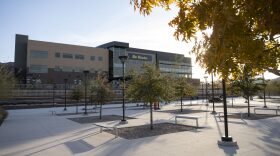COVID-19, the coronavirus that has sickened tens of thousands in China and killed more than 2,800 people worldwide, has yet to make landfall in Las Vegas.
That doesn’t mean the city isn’t bracing for the worst.
The World Health Organization has raised its risk assessment of the virus to “very high,” urging every government to be ready for an outbreak.
Las Vegas is an international destination. So, concern is high.
Brian Labus is an assistant professor at UNLV's School of Public Health. He said it seems really basic, but washing your hands, staying away from crowds - if you can - and wiping down surfaces is the best way to protect yourself and your family from any communicable disease, including the novel coronavirus.
"At this point, there is no vaccine. There is nothing else you can do beyond that," he said. "Those are basic steps we take for a lot of different diseases."
He also pointed out that we're still in the middle of flu season, which you are more likely to be exposed to than the coronavirus.
Despite the growing concern, Labus said there is no reason to panic.
"This is another virus that showed up that we have to deal with," he said, "We're still learning a lot about it, but this is not the end of the world. We're not seeing a respiratory disease that has a death rate of 80 or 90 percent... this is a concern, but it is nothing to be panicked about."
Dr. Vit Kraushaar is a medical investigator with the Southern Nevada Health District.
He agreed with Labus that a lot is not known about the virus, and that the best advice right now is to wash your hands with soap for 20 seconds, try not to touch your face and clean hard surfaces frequently.
As far as the city's biggest industry, Dr. Kraushaar said the health district is working with casinos to make sure their emergency plans are up-to-date.
"This is not something where the health district wants to just impose something on other organizations, be they gaming organizations or schools," he said, "We really want to work with them to try and figure out the best way to tackle the situation."
The virus outbreak has already caused instability in markets around the world. In Las Vegas, the economic impact likely won't be known until the first quarter numbers are released in a few weeks, according to Mike PeQueen, managing director and partner at Hightower Advisors.
"We are going to impacted by this and we should probably set our expectations, separate from the health and human tragedy that we might experience... the economic event is one that we need to mentally prepare for," he said.
The economic impact has already hit Las Vegas' Chinatown.
Bill Wong is a consultant and board member of the Las Vegas Asian Chamber of Commerce.
He told KNPR's State of Nevada that businesses in the area have seen a 25 percent drop in business, and on the Strip, Asian restaurants have seen a 50 percent drop.
The biggest reason is the drop in the number of travelers from China and other Asian countries. However, another reason is the stigmatization by the general public about eating at a Chinese restaurant.
"There is a lot of folks with fear [of] going to an Asian restaurant. They don't want to contract," he said. "That's a double impact on those restaurants."
Wong said many in the Asian community have felt that perception of them has changed since the virus outbreak started. He said people do feel like the general public is more afraid of them because of where they are from.
But he hasn't heard of any specific cases of outright racial discrimination.
The virus outbreak has caused a lot of concern, and unfortunately, a lot of misinformation.
Dr. Kraushaar and Labus addressed some of those fears and misinformation:
MASKS:
Labus: You have to have the right mask and you have to wear it properly. There is really no reason to go out and buy masks right now. They're not actually going to anything other than provide a false sense of security.
OUTBREAK WILL END WITH WARM WEATHER:
Labus: The heat that we have here, the humidity and the UV, actually plays a big part, the UV from sunlight. It really comes down to virus by virus. Some of them are very sensitive where just a little bit of UV or a slight change in temperature is enough to kill them. Other ones can be a lot more hardy. I think with coronavirus, we just don't know all the details.
PEOPLE WITH COMPROMISED IMMUNE SYSTEMS:
Kraushaar: I think for people who do have compromised immune systems, or you have family members who have compromised immune systems, it is especially important to take those preventive actions.
ACCURACY OF THE MORTALITY RATE:
Kraushaar: My guess is that people who are getting tested for COVID-19 are people who have pretty bad symptoms. They're making it to their doctor. Their doctor has to have the availability of the test in these different countries. My guess is that there is a lot of people who have mild symptoms or no symptoms at all who aren't getting tested. My guess is the number of deaths is more accurate because we're really concerned about any death that looks suspicious. It is possible, and in my view, it's probably pretty likely that the actual percentage of people actually dying is lower. But, it is hard to tell. We're getting a lot of information from different countries.
STOCKING UP ON TOILET PAPER, WATER AND OTHER ESSENTIALS:
Labus: Preparing is not a bad thing, having a supply of food, having a supply of water, having a supply of pet food and medicine at home - say the pharmacy is closed for a couple of weeks, you're going to need your medications. Those are things we recommend to people.
RESOURCES
Southern Nevada Health District - Coronavirus
Centers for Disease Control and Prevention - Coronavirus
Nevada Department of Health and Human Services - Coronavirus
Dr. Vit Kraushaar, medical investigator, Southern Nevada Health District; Brian Labus, assistant professor, UNLV School of Public Health; Bill Wong, consultant and board member, Las Vegas Asian Chamber of Commerce; Mike PeQueen, managing director and partner, Hightower Advisors










